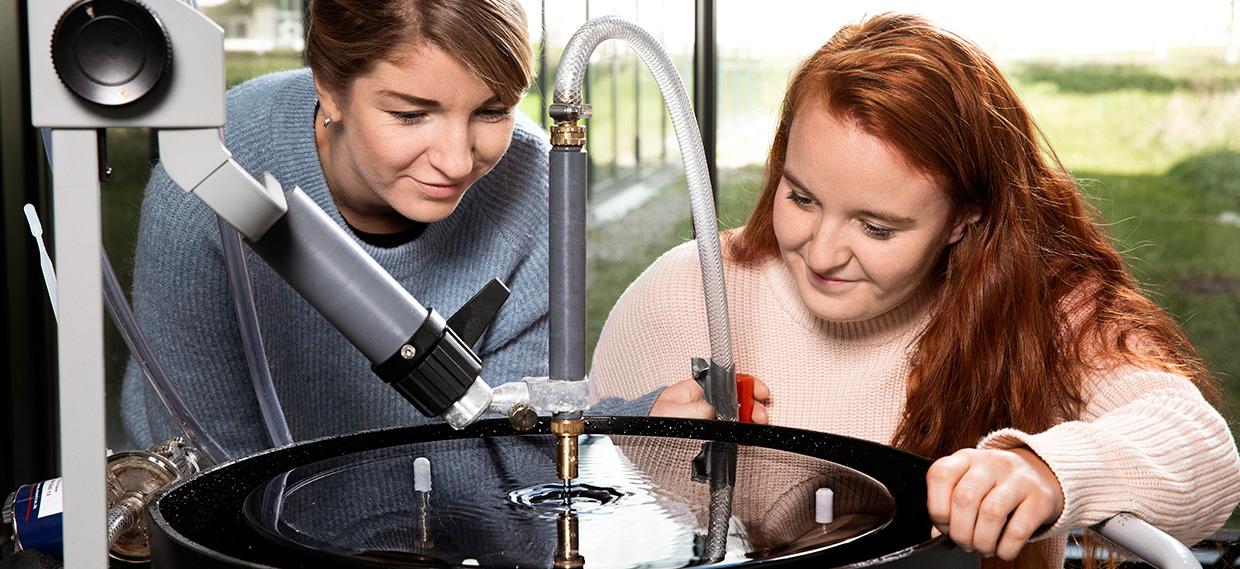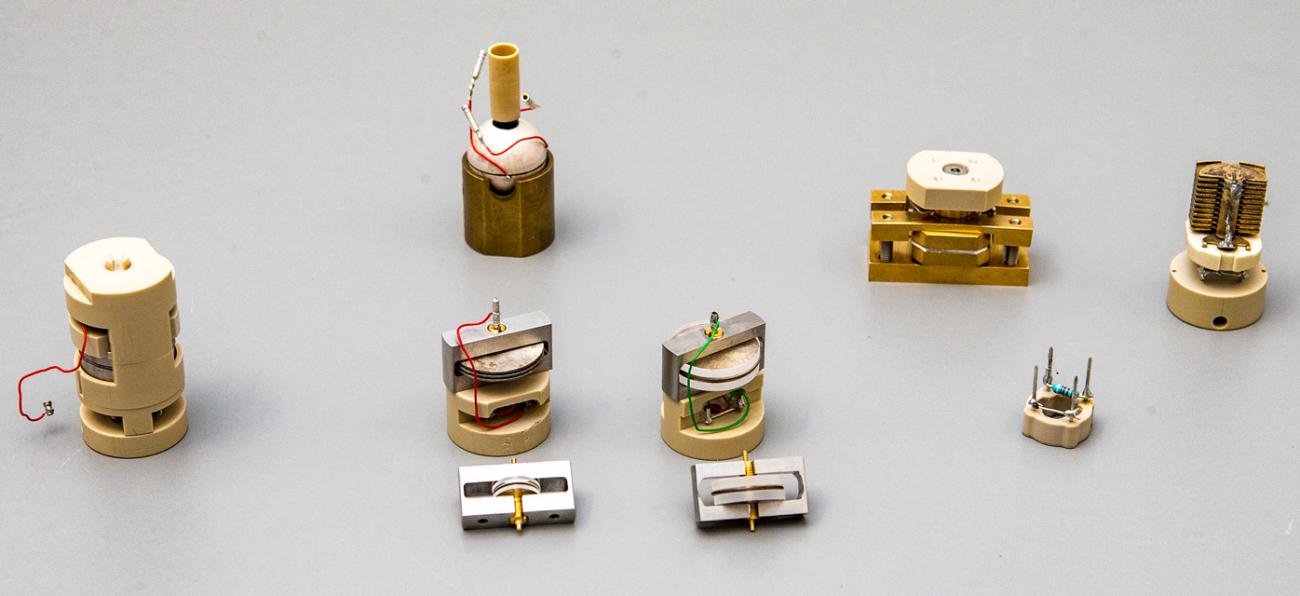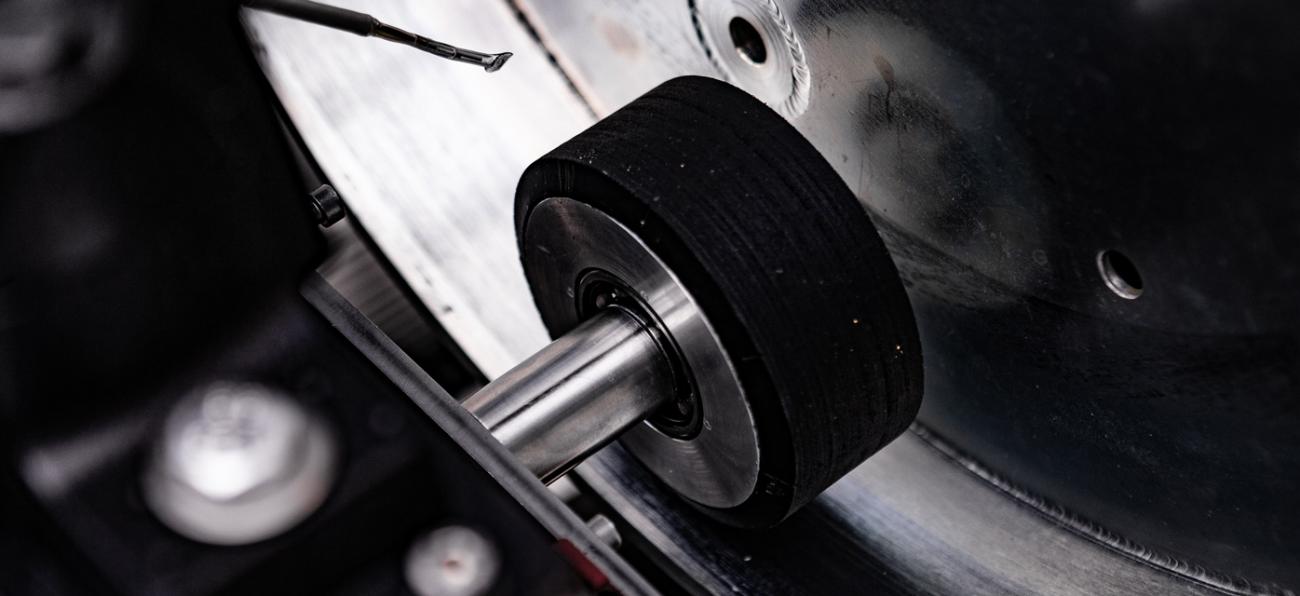The workshops at Science and Environment
The workshops at the Department of Science and Environment (INM) work with mechanical construction in all scales, electronics construction, and hardware/software integration. Many different materials are used, such as aluminium, stainless steel, wood, plastic and epoxy.
All employees and students at INM are welcome to drop by for help and advice about anything from the smallest screws to major new research projects. Feel free to come early in the idea phase, as the workshop staff have extensive experience in project development. Minor problems can often be solved immediately, time permitting – while larger tasks must always be coordinated through the workshop’s team leader.
The workshop facilities
The mechanical workshops in buildings 12 and 27 house a modern machine park, including:
- Lathes (manual and CNC-controlled)
- Milling machines (manual and CNC-controlled)
- Drills
- Equipment for welding and sheet metal working
- Various kinds of equipment for grinding and other types of surface treatment.
For design and documentation purposes, 3D design and construction software are utilized, as well as 3D printing.
The electronics workshop and the hardware/software integration group in building 27 have equipment and software at their disposal for:
- Development and troubleshooting of analogue and digital electronics
- Programming of micro-controllers (e.g. ARM and Arduino cards)
- Monitoring and control of scientific equipment.
If we can’t manage the task ourselves at our local workshops, we have contacts with many different suppliers and external partners.

The work of the workshops
Mechanical workshop, building 12
The mechanical workshop in building 12.0 primarily supports the subject group Environmental Dynamics as well as the programmes Bachelor in Natural Sciences and International Bachelor in Natural Sciences. We work for example with:
- Construction of unique solutions for experiments with small animals
- Development of equipment for use in the field, e.g. on the Galathea Marine Expedition
- Development of holders and tools for use in the biological laboratories
- Development of the subject group’s experimental setups for work with aquatic environments
- Construction of large items in metal, wood and plastic.
Mechanical workshop, building 27
The mechanical workshop in building 27 primarily supports the subject group Mathematics and Physics (IMFUFA) as well as the programmes Bachelor in Natural Sciences and International Bachelor in Natural Sciences. We work for example with:
- Precision mechanical constructions, for example in measurement cells
- Development of equipment for pressure and temperature control
- Construction of equipment for control of gases/compressed air, vacuums and coolants
- Welding, including TIG welding in stainless steel
- Work with various types of glue, including epoxy.
Electronics and hardware/software integration, building 27
The electronics and hardware/software workshop in building 27 primarily supports the subject group Mathematics and Physics (IMFUFA) and the programmes Bachelor in Natural Sciences and International Bachelor in Natural Sciences. We work for example with:
- Design and development of analogue and digital electronics (single chips, CPU, FPGA, Arm, etc.) which form part of or control measurement setups
- Development of software for the control and monitoring of experiments
- Purchasing, installation and integration of commercial measuring equipment in experimental setups
- Purchasing and installation of laboratory IT
- Project management of major projects.
This is how we use the workshops

Experimental setups for study projects
As a student, you are always welcome to contact us if you need help with your project. We are very happy to be involved in the design of experimental setups (together with your supervisor), and we have extensive knowledge of what can be done, and how to do it. So you are welcome to come along early in the project phase, before the final experiment has been formulated or determined.
Many exciting setups have been constructed in the past. Here is a small selection:
- Setup for the study of macroscopic “pancake jumps” (15 years of Nature Physics - and the film at YouTube)
- Setup to study the hydraulic jump (see photo above)
- Chaos pendulum with digital data collection
- Setup to measure superconductors
- Hourglass in a gravitational field other than that of the Earth.

Measuring instruments for research
In physics, in particular, there is a long tradition of constructing measuring instruments. The workshops at INM have been especially involved in the development of measuring instruments/cells to study the dynamics of viscous liquids (the photo above shows a selection). Many instruments have also been developed for environmental biology.
Selected examples:
- Transducers to measure the mechanical properties of glass-forming liquids over a uniquely large frequency range (Hecksher et al., J. Chem. Phys. (2013), Christensen & Olsen, Rev. Sci. Instr. (1995), Christensen & Olsen, Phys. Rev. B (1994)).
- The so-called “micro-regulator” which provides an opportunity to study physical aging in liquids far more precisely than is possible anywhere else in the world (Hecksher et al., J. Chem. Phys. (2010), Niss, Phys. Rev. Lett. (2017)).
- Pressure cells, which provide unique opportunities to combine neutron scattering with dielectric spectroscopy (Sanz et al., Rev. Sci. Instr. (2018), Hansen et al., Nature Comm. (2018)).
- Equipment for measuring frequency-dependent impedance at low frequencies (below 100 Hz), which is used in many types of experiment (Igarashi et al., Rev. Sci. Instr. (2008))
- Pump system for use in water analysis on marine expeditions.

Experimental setups for research
The workshops at INM have particularly extensive experience in developing equipment for the very precise control of temperature (and the like) in samples while they are being examined (so-called “sample environments”). In addition, a large number of lager and smaller sized specialised experimental setups have been developed, such as:
- State-of-the-art, closed-cycle cryostats for experiments with viscous liquids (Igarashi et al., Rev. Sci. Instr. (2008)).
- Advanced sample environment with fast and accurate temperature control for use at the European Spallation Source - ESS in Lund (Jakobsen et al., J. Neutron. Res. (2018)).
- Laboratory-sized setup for model verification in rolling resistance research (see photo)
- Setup to test liquids under high pressure (up to 4,000 atm.)

Base at Roskilde University
The workshop is based at Department of Science and Environment
Related research units: Glass and time research centre // FRUSTMI research centre // IMFUFA research group // Environmental Dynamics research group
PhD school: Doctoral School of Science and Environment
Degree programmes: Environmental Biology // Environmental Science // Physics // Physics and Scientific Modelling // Mathematical Bioscience // International Bachelor in Natural Sciences
Research from Roskilde University

Research facilities at INM
Find additional information about other research facilities at Department of Science and Environment:

Contact
Team leader
Bo Jakobsen
Scientific Engineer
Phone +45 4674 2630
boj@ruc.dk